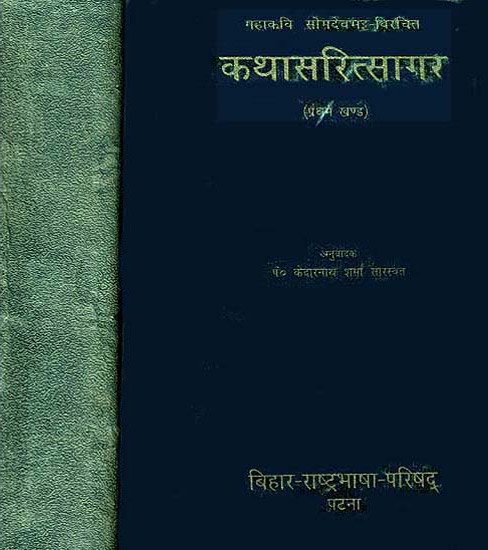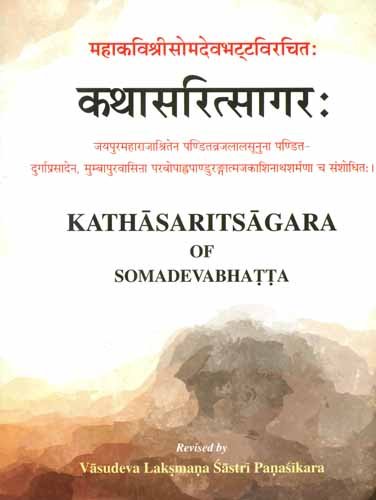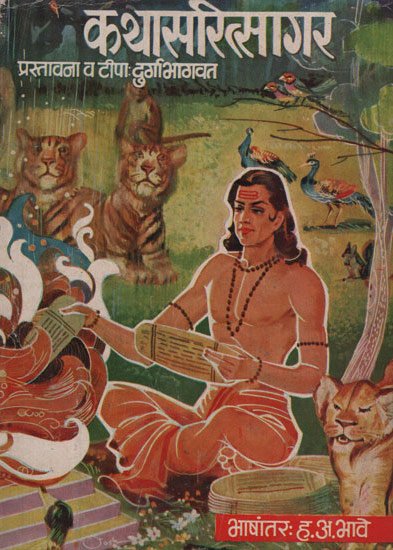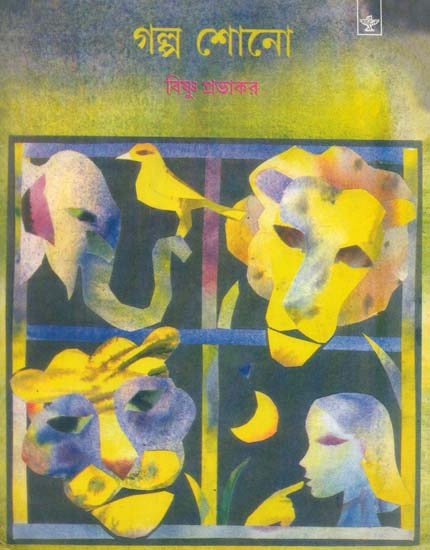Kathasaritsagara [sanskrit]
by C. H. Tawney | 2014 | 226,424 words | ISBN-13: 9789350501351
The Sanskrit edition of the Kathasaritsagara referencing the English translation and grammatical analysis. Written by Somadeva and dating from the 12th century, the Kathasaritsagara (or Katha-sarit-sagara) represents an epic legend narrating the adventures of Naravahanadatta as he strives to become the destined emperor of the Vidyadharas. Alternative titles: (Kathāsaritsāgara, कथासरित्सागर, Kathā-sarit-sāgara)
Verse 15.1.151
प्राप्ते जितप्रणतविद्रुतवैरिवीरवीताहवव्यतिकरोत्तरपार्श्वराज्ये ।
शर्वाचलस्य नरवाहनदत्तदेवः प्रीतिं परामभजताक्षतमित्त्रवर्गः ॥ १५१ ॥
prāpte jitapraṇatavidrutavairivīravītāhavavyatikarottarapārśvarājye |
śarvācalasya naravāhanadattadevaḥ prītiṃ parāmabhajatākṣatamittravargaḥ || 151 ||
The English translation of Kathasaritsagara Verse 15.1.151 is contained in the book The Ocean of Story by C.H. Tawney. This book is available online or you could buy the latest edition:
Read online Buy now! The English translation by C.H. Tawney (2014)
Glossary of Sanskrit terms
Note: This extracts Sanskrit terms and links to English definitions from the glossary, based on an experimental segmentation of verse (15.1.151). Some terms could be superfluous while some might not be mentioned. Click on the word to show English definitions.
Prapta, Prapti, Jita, Pranata, Vidruta, Vairivira, Vita, Ahava, Vyatikara, Uttara, Parshva, Rajya, Sharvacala, Naravahanadatta, Deva, Devri, Priti, Para, Mit, Tri, Tra, Avarga,
Analysis of Sanskrit grammar
Note: this is an experimental feature and only shows the first possible analysis of the Sanskrit text (Kathasaritsagara Verse 15.1.151). If the system was successful in segmenting the sentence, you will see of which words it is made up of, generally consisting of Nouns, Pronouns, Verbs, Participles and Indeclinables. Click on the link to show all possible derivations of the word.
- Line 1: “prāpte jitapraṇatavidrutavairivīravītāhavavyatikarottarapārśvarājye ”
- prāpte -
-
prāpta (noun, masculine)[locative single]prāpta (noun, neuter)[nominative dual], [vocative dual], [accusative dual], [locative single]prāptā (noun, feminine)[nominative dual], [vocative single], [vocative dual], [accusative dual]prāpti (noun, feminine)[vocative single]
- jita -
-
jita (noun, masculine)[compound], [vocative single]jita (noun, neuter)[compound], [vocative single]√ji -> jita (participle, masculine)[vocative single from √ji class 1 verb], [vocative single from √ji class 9 verb]√ji -> jita (participle, neuter)[vocative single from √ji class 1 verb], [vocative single from √ji class 9 verb]
- praṇata -
-
praṇata (noun, masculine)[compound], [vocative single]praṇata (noun, neuter)[compound], [vocative single]
- vidruta -
-
vidruta (noun, masculine)[compound], [vocative single]vidruta (noun, neuter)[compound], [vocative single]
- vairivīra -
-
vairivīra (noun, masculine)[compound], [vocative single]
- vītā -
-
vīta (noun, masculine)[compound], [vocative single]vīta (noun, neuter)[compound], [vocative single]vītā (noun, feminine)[nominative single]√vai -> vīta (participle, masculine)[vocative single from √vai class 1 verb]√vai -> vīta (participle, neuter)[vocative single from √vai class 1 verb]√vai -> vītā (participle, feminine)[nominative single from √vai class 1 verb]√vī -> vīta (participle, masculine)[vocative single from √vī class 2 verb]√vī -> vīta (participle, neuter)[vocative single from √vī class 2 verb]√vī -> vītā (participle, feminine)[nominative single from √vī class 2 verb]√vī -> vīta (participle, masculine)[vocative single from √vī class 4 verb]√vī -> vīta (participle, neuter)[vocative single from √vī class 4 verb]√vī -> vītā (participle, feminine)[nominative single from √vī class 4 verb]√vyā -> vīta (participle, masculine)[vocative single from √vyā class 1 verb]√vyā -> vīta (participle, neuter)[vocative single from √vyā class 1 verb]√vyā -> vītā (participle, feminine)[nominative single from √vyā class 1 verb]√vī (verb class 2)[imperative active second plural]
- āhava -
-
āhava (noun, masculine)[compound], [vocative single]
- vyatikaro -
-
vyatikara (noun, masculine)[compound], [vocative single]vyatikara (noun, neuter)[compound], [vocative single]vyatikarā (noun, feminine)[nominative single]
- uttara -
-
uttara (noun, neuter)[compound], [vocative single]uttara (noun, masculine)[vocative single]
- pārśva -
-
pārśva (noun, masculine)[compound], [vocative single]pārśva (noun, neuter)[compound], [vocative single]
- rājye -
-
rājya (noun, masculine)[locative single]rājya (noun, neuter)[nominative dual], [vocative dual], [accusative dual], [locative single]rājyā (noun, feminine)[nominative dual], [vocative single], [vocative dual], [accusative dual]√rāj -> rājya (participle, masculine)[locative single from √rāj class 1 verb], [locative single from √rāj]√rāj -> rājya (participle, neuter)[nominative dual from √rāj class 1 verb], [vocative dual from √rāj class 1 verb], [accusative dual from √rāj class 1 verb], [locative single from √rāj class 1 verb], [nominative dual from √rāj], [vocative dual from √rāj], [accusative dual from √rāj], [locative single from √rāj]√rāj -> rājyā (participle, feminine)[nominative dual from √rāj class 1 verb], [vocative single from √rāj class 1 verb], [vocative dual from √rāj class 1 verb], [accusative dual from √rāj class 1 verb], [nominative dual from √rāj], [vocative single from √rāj], [vocative dual from √rāj], [accusative dual from √rāj]√rāj (verb class 1)[present passive first single]√rāj (verb class 0)[present passive first single]
- Line 2: “śarvācalasya naravāhanadattadevaḥ prītiṃ parāmabhajatākṣatamittravargaḥ ”
- śarvācalasya -
-
śarvācala (noun, masculine)[genitive single]
- naravāhanadatta -
-
naravāhanadatta (noun, masculine)[compound], [vocative single]
- devaḥ -
-
deva (noun, masculine)[nominative single]devṛ (noun, masculine)[vocative single]
- prītim -
-
prīti (noun, feminine)[accusative single]
- parām -
-
parā (noun, feminine)[accusative single]
- abhajatā -
-
√bhaj (verb class 1)[imperfect active second plural], [imperfect middle third single]
- ākṣata -
-
√akṣ (verb class 1)[imperfect active second plural]
- mit -
-
mit (noun, feminine)[compound], [adverb], [nominative single], [vocative single]
- tra -
-
tṛ (noun, neuter)[compound], [adverb], [nominative single], [vocative single], [accusative single]tra (noun, masculine)[compound], [vocative single]tra (noun, neuter)[compound], [vocative single]
- avargaḥ -
-
avarga (noun, masculine)[nominative single]
Other editions:
Also see the following editions of the Sanskrit text or (alternative) English translations of the Kathasaritsagara Verse 15.1.151
Kathasaritsagar
by Kedarnath Sharma Saraswat (2005)
The Only Edition with the Sanskrit Text and its Hindi Translation (An Old and Rare Book) Set of 3 Vol.
Buy now!
Kathasaritsagara of Somadeva Bhatta (Sanskrit Text Only)
by Vasudeva Laksmana Sastri (2013)
Katha Sarit Sagar in Marathi
by H. A Bhave (1995)
Set of 5 Volumes; Published by Varada Books, Pune. 2256 pages (Throughout B/W Illustrations).
Buy now!
Katha Sarit Sagara (Tamil)
by S. V. Ganapati (எஸ். வி. கணபதி) (2014)
[கதா சரித் சாகரம்] Published by Alliance Publications.
Buy now!
Galpa Shono
by Abhijit Chattopadhyay (2014)
[গল্প শোনো] Galpa Shono: Bengali Translation of 'Suno Kahani From Katha Sarit Sagar'; 9788126015436; Published by Sahitya Akademi, Delhi.
Buy now!Preview of verse 15.1.151 in Bengali sript:
প্রাপ্তে জিতপ্রণতবিদ্রুতবৈরিবীরবীতাহবব্যতিকরোত্তরপার্শ্বরাজ্যে ।
শর্বাচলস্য নরবাহনদত্তদেবঃ প্রীতিং পরামভজতাক্ষতমিত্ত্রবর্গঃ ॥ ১৫১ ॥
![Kathasaritsagara [sanskrit] - book cover](/uploads/a/Katha-Sarit-Sagara.jpg)




